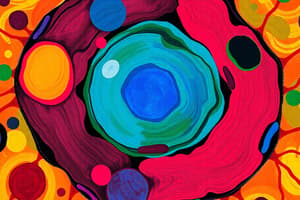Podcast
Questions and Answers
Which statement correctly describes the nuclear envelope of a eukaryotic cell?
Which statement correctly describes the nuclear envelope of a eukaryotic cell?
- All of the proteins of the cell are synthesized on ribosomes bound on the nuclear envelope.
- The nuclear envelope is continuous with the endoplasmic reticulum. (correct)
- The outer layer of the nuclear envelope is lined with a lamina.
- The nuclear envelope is a single membrane consisting of a phospholipid bilayer.
- Plasmodesmata in the nuclear envelope permit the exchange of macromolecules between the nucleus and the cytoplasm.
Which of these cell junctions form a barrier to the passage of materials?
Which of these cell junctions form a barrier to the passage of materials?
- Keratin fibers
- Plasmodesmata
- Desmosomes (anchoring junctions)
- Tight junctions (correct)
- Gap (communicating) junctions
The primary role of _____ is to bind animal cells together.
The primary role of _____ is to bind animal cells together.
- Plasmodesmata
- Desmosomes (correct)
- Tight junctions
- Gap (communicating) junctions
- The cytoskeleton
_____ aid in the coordination of the activities of adjacent animal cells.
_____ aid in the coordination of the activities of adjacent animal cells.
Where would the black spots appear on an emulsion prepared 3 hours after labeling pancreatic cells?
Where would the black spots appear on an emulsion prepared 3 hours after labeling pancreatic cells?
What path does a protein in the secretory pathway take, starting from its site of synthesis?
What path does a protein in the secretory pathway take, starting from its site of synthesis?
Which of the following conclusions can be drawn from the above pulse-chase experiment results?
Which of the following conclusions can be drawn from the above pulse-chase experiment results?
What scientific hypotheses can be tested by a pulse-chase experiment?
What scientific hypotheses can be tested by a pulse-chase experiment?
Proteins produced during the 'chase' phase of a pulse-chase experiment are labeled with radioactive material.
Proteins produced during the 'chase' phase of a pulse-chase experiment are labeled with radioactive material.
What is the first step in a pulse-chase experiment?
What is the first step in a pulse-chase experiment?
Choose the best description of the cell cytoskeleton.
Choose the best description of the cell cytoskeleton.
Which of the following functions is NOT associated with the cytoskeleton in eukaryotic cells?
Which of the following functions is NOT associated with the cytoskeleton in eukaryotic cells?
Mitochondria are found in __________.
Mitochondria are found in __________.
Which organelle plays a role in intracellular digestion?
Which organelle plays a role in intracellular digestion?
In a cell exposed to cyanide, most of the cyanide will be in:
In a cell exposed to cyanide, most of the cyanide will be in:
The cilia and flagella of eukaryotic cells are composed of _____.
The cilia and flagella of eukaryotic cells are composed of _____.
Choose the letter that indicates the organelle that contains most of a cell's DNA.
Choose the letter that indicates the organelle that contains most of a cell's DNA.
Which of these organelles carries out cellular respiration?
Which of these organelles carries out cellular respiration?
Which of these is the double membrane that encloses the nucleus?
Which of these is the double membrane that encloses the nucleus?
The _____ is composed of DNA and protein.
The _____ is composed of DNA and protein.
Ribosomal subunits are manufactured by the _____.
Ribosomal subunits are manufactured by the _____.
_____ are the sites of protein synthesis.
_____ are the sites of protein synthesis.
Which of these organelles manufactures proteins bound for secretion out of the cell?
Which of these organelles manufactures proteins bound for secretion out of the cell?
The _____ is a selective barrier, regulating the passage of material into and out of the cell.
The _____ is a selective barrier, regulating the passage of material into and out of the cell.
Where is calcium stored?
Where is calcium stored?
Which of these structures stores, modifies, and packages products?
Which of these structures stores, modifies, and packages products?
Which of these are hollow rods that shape and support the cell?
Which of these are hollow rods that shape and support the cell?
_____ is/are identical in structure to centrioles.
_____ is/are identical in structure to centrioles.
Which of these organelles produces H2O2 as a by-product?
Which of these organelles produces H2O2 as a by-product?
Which of these provides the cell with structural support?
Which of these provides the cell with structural support?
The fundamental characteristics of life include the ability to _____
The fundamental characteristics of life include the ability to _____
How does a cell display the fundamental characteristics of life?
How does a cell display the fundamental characteristics of life?
Why does the phenomenon called 'life' appear only at the level of the cell and not at the level of an organelle or an even smaller level?
Why does the phenomenon called 'life' appear only at the level of the cell and not at the level of an organelle or an even smaller level?
Complete a scheme of the integration of the main functions performed by the organelles of a cell.
Complete a scheme of the integration of the main functions performed by the organelles of a cell.
Which of the following functions is NOT associated with the cytoskeleton in eukaryotic cells?
Which of the following functions is NOT associated with the cytoskeleton in eukaryotic cells?
Which statement about extracellular structures (plant cell walls and the extracellular matrix of animal cells) is correct?
Which statement about extracellular structures (plant cell walls and the extracellular matrix of animal cells) is correct?
Which of the following is a common trait of chloroplasts and mitochondria?
Which of the following is a common trait of chloroplasts and mitochondria?
Which one of the following statements about the endomembrane system is correct?
Which one of the following statements about the endomembrane system is correct?
Which statement about extracellular structures (plant cell walls and the extracellular matrix of animal cells) is correct?
Which statement about extracellular structures (plant cell walls and the extracellular matrix of animal cells) is correct?
Flashcards are hidden until you start studying
Study Notes
Nuclear Envelope and Cell Junctions
- The nuclear envelope is continuous with the endoplasmic reticulum, allowing for interaction between the two structures.
- Tight junctions form barriers that prevent the passage of materials between cells, maintaining the integrity of tissue.
- Desmosomes serve to bind animal cells together, providing mechanical strength.
Communication Between Cells
- Gap junctions facilitate the coordination of activities between adjacent animal cells by allowing material transfer.
- Plasmodesmata serve a similar function in plant cells, enabling communication between neighboring cells.
Protein Synthesis and Secretion Pathway
- Pancreatic cells secrete digestive enzymes; radioactive labeling reveals proteins are found outside the cell after 3 hours.
- In the secretory pathway, proteins are synthesized in the rough endoplasmic reticulum, processed in the Golgi apparatus, transported via secretory vesicles, and ultimately secreted through the plasma membrane.
- Protein tracking in pulse-chase experiments indicates that the final destination for secreted proteins is often the lysosome.
Pulse-Chase Experiment Insights
- Pulse-chase experiments track the movement of molecules within cells over time.
- Proteins produced during the chase phase are not labeled, as nonradioactive material is introduced.
- The first step of a pulse-chase experiment involves incubating cells with a labeled molecule.
Cytoskeleton and Cellular Functions
- The cytoskeleton is a dynamic network of fibers, allowing for shape change and repositioning of organelles within the cell.
- Functions of the cytoskeleton include maintaining cell shape, aiding muscle contraction, and facilitating movement of cilia and flagella.
Organelles and Cellular Processes
- Mitochondria are present in both plant and animal cells, converting organic molecules into ATP through cellular respiration.
- Lysosomes play a crucial role in intracellular digestion by breaking down waste materials and cellular debris.
- The rough endoplasmic reticulum is responsible for synthesizing secretory proteins, while ribosomes are the sites of protein synthesis.
Membrane Structures and Functions
- The plasma membrane selectively regulates the flow of materials into and out of the cell.
- The smooth endoplasmic reticulum stores calcium and is involved in lipid synthesis and detoxification.
- The Golgi apparatus modifies, packages, and sorts proteins and lipids received from the endoplasmic reticulum.
Emergent Properties of Cells
- Life emerges from the integration of functions performed by various cell organelles.
- Organelles interact and depend on one another for optimal functioning and survival.
Extracellular Structures and Communication
- Extracellular structures transmit information to the cytoplasm through mechanical and chemical signaling.
- Chloroplasts and mitochondria share the trait of containing their own DNA, an essential feature for organelle functionality.
Endomembrane System Functionality
- The endomembrane system consists of interconnected membrane-bound compartments, where proteins intended for secretion are processed.
- Communication and coordination between cellular processes are key to maintaining homeostasis and overall cell function.
Studying That Suits You
Use AI to generate personalized quizzes and flashcards to suit your learning preferences.




